Posted on April 2nd, 2012 by Mary Lord
 Engineering researchers who toil in the field of sanitation, especially sanitation for the world’s poorest citizens, used to find that their field carried about as much cachet as a fly-ridden latrine. Not anymore. In July, 2011, the Bill & Melinda Gates Foundation announced eight grants totaling $3 million for university engineering projects to “Reinvent the Toilet.”
Engineering researchers who toil in the field of sanitation, especially sanitation for the world’s poorest citizens, used to find that their field carried about as much cachet as a fly-ridden latrine. Not anymore. In July, 2011, the Bill & Melinda Gates Foundation announced eight grants totaling $3 million for university engineering projects to “Reinvent the Toilet.”
Read More
Filed under: Special Features | Comments Off on Feature: Bill Gates Wants to Reinvent Toilets
Tags: Clean Water, Grand Challenges, Waste management, Water, Water management
Posted on November 27th, 2011 by Jaimie Schock
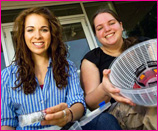 In many poor, rural areas of the world, scourges like malaria, HIV/AIDS, and malnutrition are endemic. Blood tests for anemia are a quick way to diagnose them, but it can take days to get results back from hospitals many miles away. Last year, a multidisciplinary team of Rice University undergraduates devised a clever solution: It’s a centrifuge fashioned from a common salad spinner.
In many poor, rural areas of the world, scourges like malaria, HIV/AIDS, and malnutrition are endemic. Blood tests for anemia are a quick way to diagnose them, but it can take days to get results back from hospitals many miles away. Last year, a multidisciplinary team of Rice University undergraduates devised a clever solution: It’s a centrifuge fashioned from a common salad spinner.
Read More
Filed under: Special Features | Comments Off on Feature: Low Cost, High Impact
Tags: Clean Water, Disease, Engineers Without Borders, Health, Healthcare, University outreach, Water management
Posted on October 11th, 2010 by ASEE
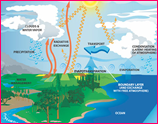 In this lesson from the Peace Corps, students in grades 3-8 learn how to generate fresh water from seawater, using the power of the sun. They study the water challenges in Cape Verde and the advantages of distilling water through a simple solar sill. They then build and evaluate a working model.
In this lesson from the Peace Corps, students in grades 3-8 learn how to generate fresh water from seawater, using the power of the sun. They study the water challenges in Cape Verde and the advantages of distilling water through a simple solar sill. They then build and evaluate a working model.
Read More
Filed under: Grades 6-8, Grades K-5, Lesson Plans | 1 Comment »
Tags: Clean Water, Environmental Engineering, Peace Corps Cape Verde, Water management
Posted on June 7th, 2010 by Jaimie Schock
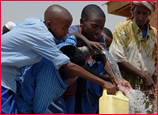 Three rivers run through Pittsburgh, so it is blessed with an abundance of potable water. But 3 billion people across the globe, nearly half the world’s population, don’t have ready access to fresh water. That was the lesson driven home to 550 high school students at a recent daylong tutorial sponsored by the World Affairs Council of Pittsburgh.
Three rivers run through Pittsburgh, so it is blessed with an abundance of potable water. But 3 billion people across the globe, nearly half the world’s population, don’t have ready access to fresh water. That was the lesson driven home to 550 high school students at a recent daylong tutorial sponsored by the World Affairs Council of Pittsburgh.
Read More
Filed under: K-12 Education News | Comments Off on Students Converge to Talk Water
Tags: Clean Water, Public Policy, Water, Water management, Water Resources
Posted on May 10th, 2010 by ASEE
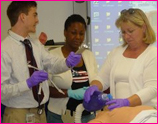 The Aquatic Systems: Emerging Problems and Creative Solutions Institute, University of Florida, July 12-16, 2010, highlights significant research on Florida coastal and inland aquatic systems. Activities include field work and laboratory activities suitable for all classes. The course emphasizes contaminants that affect human and environmental health. Eligibility: Secondary School Science Teachers. Cost: $450. Application Deadline: Not stated, but early registration encouraged. Update to be announced Spring 2011.
The Aquatic Systems: Emerging Problems and Creative Solutions Institute, University of Florida, July 12-16, 2010, highlights significant research on Florida coastal and inland aquatic systems. Activities include field work and laboratory activities suitable for all classes. The course emphasizes contaminants that affect human and environmental health. Eligibility: Secondary School Science Teachers. Cost: $450. Application Deadline: Not stated, but early registration encouraged. Update to be announced Spring 2011.
Read More
Filed under: K-12 Outreach Programs | Comments Off on Teachers’ Summer: Institute on Aquatic Systems. U. Florida, July 12-16, 2010
Tags: Environmental science, Programs for Teachers, Summer Programs (Teachers), Water management
Posted on May 10th, 2010 by ASEE
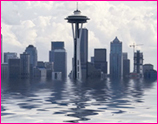
If all burning of fossil fuels were to cease tomorrow, the build-up of greenhouse gases in the Earth’s atmosphere is still severe enough that in 2100, we are still looking at a world at least several degrees warmer than during the pre-industrial era. That warming brings with it certain hazards – droughts, the spread of infectious diseases, the extinction of species. One hazard in particular will require an engineering response: the rise of sea levels.
Read More
Filed under: Special Features | 1 Comment »
Tags: Climate Change, Marine engineering, Ocean, Water management, Water Resources
Posted on April 19th, 2010 by ASEE
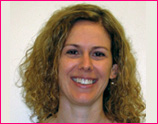 Students have to grapple with real-world applications of environmental engineering, Prof. Jeanine Plummer of Worcester Polytechnic Institute believes: “They need to see how it applies, why it’s important — ‘why am I here’ sort of questions.” An article from ASEE’s Prism magazine.
Students have to grapple with real-world applications of environmental engineering, Prof. Jeanine Plummer of Worcester Polytechnic Institute believes: “They need to see how it applies, why it’s important — ‘why am I here’ sort of questions.” An article from ASEE’s Prism magazine.
Read More
Filed under: Special Features | Comments Off on Feature: Open Door, Open Heart
Tags: Clean Water, Environmental Engineering, Water management
Posted on April 19th, 2010 by ASEE
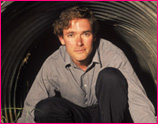
First, Marc Edwards discovered high levels of lead in Washington D.C.’s drinking water, then he had to persuade the bureaucracy to get the word out — an article from ASEE’s Prism magazine, by Pierre Holme-Douglas
Read More
Filed under: Special Features | Comments Off on Engineer Profile: Marc Edwards
Tags: Clean Water, Environmental Engineering, Water management
Posted on January 4th, 2010 by Jaimie Schock
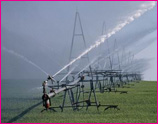 This lesson explores how civil engineering has solved the challenge of moving water through irrigation. Students work in teams to design and build their own model irrigation system out of everyday items. They test their systems, evaluate their results, and present their findings to the class.
This lesson explores how civil engineering has solved the challenge of moving water through irrigation. Students work in teams to design and build their own model irrigation system out of everyday items. They test their systems, evaluate their results, and present their findings to the class.
Read More
Filed under: Grades 6-8, Grades 6-8, Grades 9-12, Grades 9-12, Lesson Plans | 2 Comments »
Tags: Agricultural, Grades 6-8, Lesson Plans, Water management
 Engineering researchers who toil in the field of sanitation, especially sanitation for the world’s poorest citizens, used to find that their field carried about as much cachet as a fly-ridden latrine. Not anymore. In July, 2011, the Bill & Melinda Gates Foundation announced eight grants totaling $3 million for university engineering projects to “Reinvent the Toilet.”
Engineering researchers who toil in the field of sanitation, especially sanitation for the world’s poorest citizens, used to find that their field carried about as much cachet as a fly-ridden latrine. Not anymore. In July, 2011, the Bill & Melinda Gates Foundation announced eight grants totaling $3 million for university engineering projects to “Reinvent the Toilet.”









 In this lesson from the Peace Corps, students in grades 3-8 learn how to generate fresh water from seawater, using the power of the sun. They study the water challenges in Cape Verde and the advantages of distilling water through a simple solar sill. They then build and evaluate a working model.
In this lesson from the Peace Corps, students in grades 3-8 learn how to generate fresh water from seawater, using the power of the sun. They study the water challenges in Cape Verde and the advantages of distilling water through a simple solar sill. They then build and evaluate a working model. Three rivers run through Pittsburgh, so it is blessed with an abundance of potable water. But 3 billion people across the globe, nearly half the world’s population, don’t have ready access to fresh water. That was the lesson driven home to 550 high school students at a recent daylong tutorial sponsored by the World Affairs Council of Pittsburgh.
Three rivers run through Pittsburgh, so it is blessed with an abundance of potable water. But 3 billion people across the globe, nearly half the world’s population, don’t have ready access to fresh water. That was the lesson driven home to 550 high school students at a recent daylong tutorial sponsored by the World Affairs Council of Pittsburgh. The Aquatic Systems: Emerging Problems and Creative Solutions Institute, University of Florida, July 12-16, 2010, highlights significant research on Florida coastal and inland aquatic systems. Activities include field work and laboratory activities suitable for all classes. The course emphasizes contaminants that affect human and environmental health. Eligibility: Secondary School Science Teachers. Cost: $450. Application Deadline: Not stated, but early registration encouraged. Update to be announced Spring 2011.
The Aquatic Systems: Emerging Problems and Creative Solutions Institute, University of Florida, July 12-16, 2010, highlights significant research on Florida coastal and inland aquatic systems. Activities include field work and laboratory activities suitable for all classes. The course emphasizes contaminants that affect human and environmental health. Eligibility: Secondary School Science Teachers. Cost: $450. Application Deadline: Not stated, but early registration encouraged. Update to be announced Spring 2011.
 Students have to grapple with real-world applications of environmental engineering, Prof. Jeanine Plummer of Worcester Polytechnic Institute believes: “They need to see how it applies, why it’s important — ‘why am I here’ sort of questions.” An article from ASEE’s Prism magazine.
Students have to grapple with real-world applications of environmental engineering, Prof. Jeanine Plummer of Worcester Polytechnic Institute believes: “They need to see how it applies, why it’s important — ‘why am I here’ sort of questions.” An article from ASEE’s Prism magazine.
